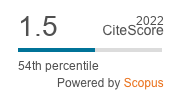Implementing the Main Circular Economy Principles within the Concept of Sustainable Development in the Global and European economy, with Particular Emphasis on Central and Eastern Europe – the Case of Poland and the Region of Lodz
DOI:
https://doi.org/10.2478/cer-2018-0020Keywords:
sustainable development, bio‑economy, circular economy, region of LodzAbstract
The aim of the article is to present the effects of selected activities implemented at the global, European and regional levels within the idea of sustainable development. Of particular importance here is the presentation of activities undertaken at the level of the Lodz region (one of the central regions of Poland) in which among 6 regional specializations, particular attention was paid to innovative organic farming and to the textile industry based on modern fashion and innovative design. All 6 specializations in the Lodz region, including medicine, pharmacy and the cosmetics industry, advanced building materials, electricity generation (including renewable energy sources), IT and telecommunications were directed to the implementation of the overarching bio‑economy program aiming at achieving the main assumptions of the circular economy based on the 3Rs, i.e., “reduce, reuse, and recycle.”
Downloads
References
20 years of Bio‑Trade, Connecting People, Planet and Markets, UNCTAD 2017, http://unctad.org/en/PublicationsLibrary/ditcted2016d4_en.pdf, [accessed: 17.04.2018].
Google Scholar
2007 Environment policy review, Communication from the Commission to the Council and the European Parliament of 2 July 2008 [COM(2008) 409 final – not published in the Official Journal], https://eur-lex.europa.eu/legal-content/EN/TXT/?uri=CELEX:52008DC0409, [accessed: 15.03.2018].
Google Scholar
Borys, T. (2013), Nowe kierunki ekonomii środowiska i zasobów naturalnych w aspekcie nowej perspektywy finansowej Unii Europejskiej, ʽEkonomia i Środowiskoʼ [Economy and Environment], 1/44.
Google Scholar
Burchard‑Dziubińska, M. (ed.) (2015), Towards a Green Economy .From ideas to practice, Wydawnictwo Uniwersytetu Łódzkiego, Łódź.
Google Scholar
Closing the loop – An EU action plan for the Circular Economy, Communication From the Commission to the European Parliament, The Council, The European Economic and Social Committee and The Committee of Regions, European Commission, Brussels, 2.12.2015 [COM(2015) 614 final].
Google Scholar
Fiedor, B. (ed.) (2002), Podstawy ekonomii środowiska i zasobów naturalnych, CH BECK Publishing House.
Google Scholar
Fiedor, B., Graczyk, A. (ed.) (2006), Instrumenty ekonomiczne polityki ekologicznej, Wydawnictwo Ekonomia i Środowisko, Białystok.
Google Scholar
https://ec.europa.eu/research/bioeconomy/index.cfm?pg=policy, [accessed: 15.03.2018].
Google Scholar
https://trade.ec.europa.eu/doclib/press/index.cfm?id=1116, [accessed: 26.02.2018].
Google Scholar
https://www.wto.org/english/tratop_e/envir_e/ega_e.htm, [accessed: 15.03.2018].
Google Scholar
Kowalski, Z., Kulczycka, J., Góralczyk, M. (2007), Ecological Evaluation of LCA, Wydawnictwo Naukowe PWN, Warszawa.
Google Scholar
Kronenberg, J., Bergier, T. (2010), Sustainable Development in Poland, Godzimir Foundation, Kraków.
Google Scholar
Lipińska, D. (2015), Zrównoważona gospodarka wodno‑ściekowa jako element poprawy bezpieczeństwa ekologicznego, [in:] Helena Marek, Zduniak A. (ed.), Bezpieczeństwo – wielorakie perspektywy. Bezpieczeństwo z perspektyw środowisk i obszarów, Wydawnictwo Wyższej Szkoły Bezpieczeństwa w Poznaniu, Poznań.
Google Scholar
Lipińska, D. (2016), Gospodarka odpadowa i wodno‑ściekowa, Wydawnictwo Uniwersytetu Łódzkiego, Łódź.
Google Scholar
Lipińska, D. (2016), Podstawy inżynierii Środowiska, Wydawnictwo Uniwersytetu Łódzkiego, Łódź.
Google Scholar
The National Waste Management Plan 2014 in Poland, Warsaw, 2015, https://climateobserver.org/wp‑content/uploads/2014/09/Poland_National‑Waste‑Management‑Plan–2014.pdf, [accessed: 9.10.2017].
Google Scholar
Poskrobko, B. (2007), Environmental Management, PWE, Warszawa.
Google Scholar
Report from the Commission to the European Parliament, The Council, The European Economic and Social Committee and The Committee of Regions on the implementation of the Circular Economy Action Plan; Brussels, 26.01.2017, COM(2017) 33 final, [accessed: 7.03.2018].
Google Scholar
Rydz‑Żbikowska, A. (2015), Wspólna polityka rolna i rolnictwo ekologiczne jako jedno z największych wyzwań w zakresie integracji państw członkowskich Unii Europejskiej, [in:] Molendowski, E., Mroczek, A. (eds.) Globalizacja i regionalizacja we współczesnym świecie. Wyzwania integracji i rozwoju, SGH Warszawa.
Google Scholar
Snick, A. (2016), MISC: Mapping Innovations on the Sustainability Curve, A methodological Framework to Accelerate the Transition, Brussels, https://cidd2015.sciencesconf.org/52807/document, [accessed: 5.04.2018].
Google Scholar
Wysokińska, Z. (2005), Foreign Trade in Environmental Products; The WTO Regulation and Environmental Programs, ʽGlobal Economy Journalʼ, Vol. 5, Issue 3, Article 5.
Google Scholar
Wysokińska, Z. (2016), The “New” Environmental Policy of the European Union: A Path to Development of a Circular Economy and Mitigation of the Negative Effects of Climate Change, ʽComparative Economic Research. Central and Eastern Europeʼ, Vol. 19, No. 2.
Google Scholar
Wysokińska, Z. (2017), Millennium Development Goals/ UN And Sustainable Development Goals/UN As Instruments For Realizing Sustainable Development. Concept In The Global Economy, ʽComparative Economic Research. Central and Eastern Europeʼ, Vol. 20, No. 1.
Google Scholar
Wysokińska, Z., Witkowska, J. (2016), Zrównoważony Rozwój – aspekty makro i mikroekonomiczne, Łódź.
Google Scholar
Downloads
Published
How to Cite
Issue
Section
License

This work is licensed under a Creative Commons Attribution-NonCommercial-NoDerivatives 4.0 International License.











